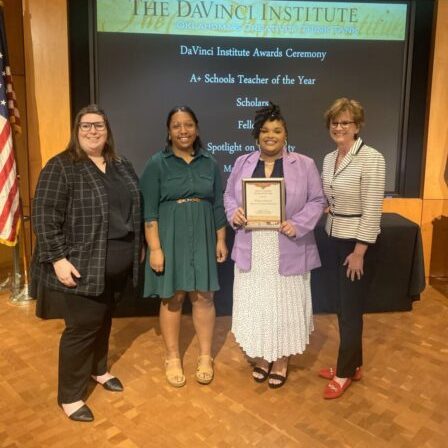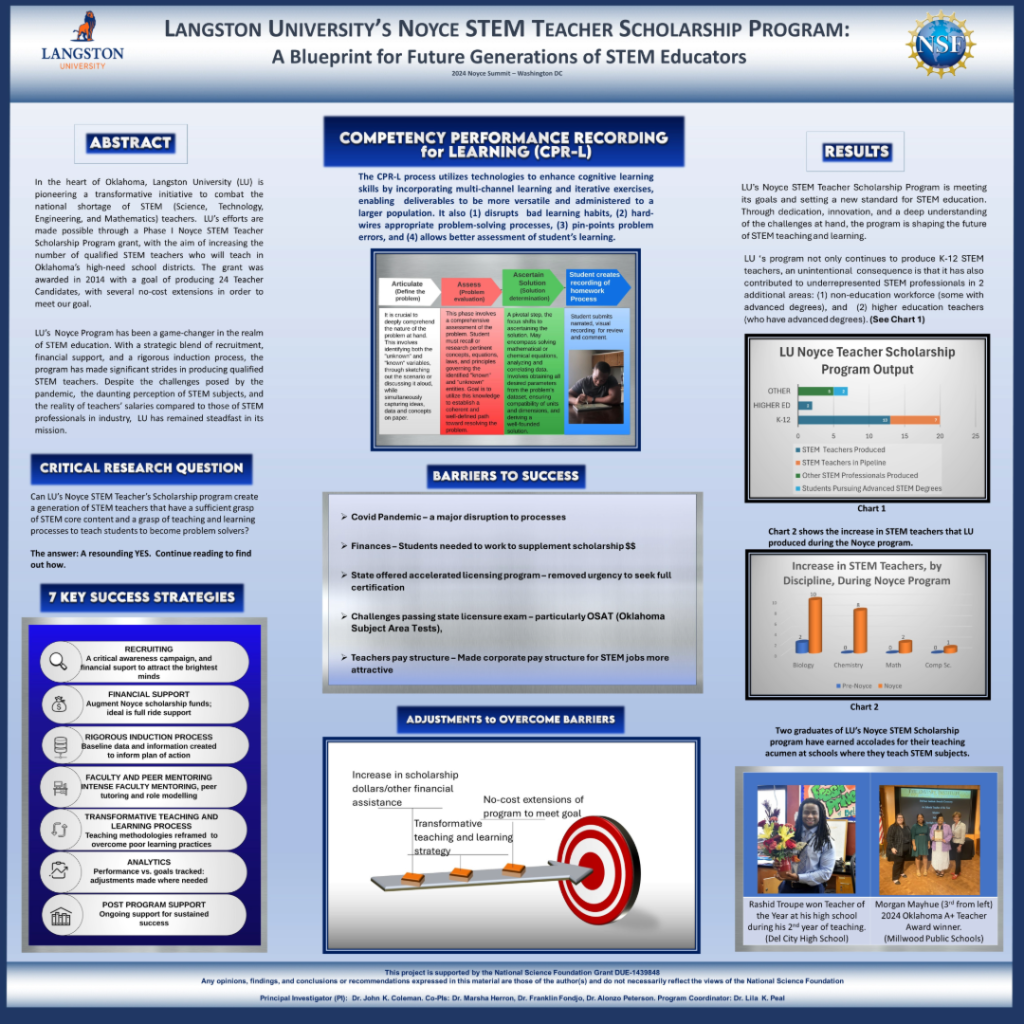Noyce STEM Teacher Scholarship Program
Overview
Teachers with greater content knowledge in a given subject and those with more teaching experience were more likely to ask higher level, cognitively based questions.National Research Council 2000. Educating Teachers of Science, Mathematics, and Technology: New Practices for the New Millennium. Washington, DC: The National Academies Press. https://doi.org/10.17226/9832
The need to close the gap between STEM education and required workplace skills have been identified in industry, academia, and government.
Langston University, the only HBCU (Historically Black College and University) in Oklahoma, was awarded a 5-year National Science Foundation’s Noyce STEM Teacher Scholarship grant in 2014.
Langston University’s Noyce STEM Teacher Scholarship Program: A Blueprint for Future Generations of Educators
In the heart of Oklahoma, Langston University (LU) is pioneering a transformative initiative to combat the national shortage of STEM (Science, Technology, Engineering, and Mathematics) teachers. LU’s efforts are made possible through a Phase I Noyce STEM Teacher Scholarship Program grant, with the aim of increasing the number of qualified STEM teachers who will teach in Oklahoma’s high-need school districts.
The LU science team pursued the Noyce STEM Teacher Scholarship grant because each member was keenly aware of the need for qualified science teachers not only from the broad coverage of this issue in literature and reports, but also based on their extensive experience teaching college level STEM courses for over half a century.
Their experience managing a STEM-centric program wherein their charge was to produce STEM graduates who would qualify for high-level STEM jobs in industry and/or pursue advanced STEM degrees made them acutely aware of the need for students to acquire greater awareness of STEM course content prior to entering college. What emerged from this program was a reality that, despite inadequate preparation for success in STEM disciplines, students adapted, learned, and leaned into STEM areas: Chemistry majors improved by 151%; Biology increased 46.7%, and Computer Science by 47.2 %. Furthermore the rate of matriculating into advanced degree programs more than doubled. Data and experiences from the LINC program, together with the group’s history of experiences with LU students were clear indications that all potential avenues
to get more LU students in STEM disciplines should be pursued. The Noyce STEM Teacher Scholarship program was one such avenue. The grant was awarded in 2014 with a goal of producing 24 Teacher Candidates, with several no-cost extensions in order to meet our goal.
LU’s Noyce Program has been a game-changer in the realm of STEM education. With a strategic blend of recruitment, financial support, and a rigorous induction process, the program has made significant strides in producing qualified STEM teachers. Despite the challenges posed by the pandemic, the daunting perception of STEM subjects, and the reality of teachers’ salaries compared to those of STEM professionals in industry, LU has remained steadfast in its mission.
The impact of the Noyce program is evident in the dramatic increase in STEM teacher graduates. During the ten year period prior to Noyce, LU had only produced two Biology teachers. The Noyce program is positioned to graduate 24 STEM teachers across multiple disciplines: 12 in Biology, 9 in Chemistry, 2 in Mathematics, and 1 in Computer Science. This substantial growth demonstrates the program’s effectiveness in diversifying and expanding the pool of qualified STEM educators.
LU's Noyce program has contributed exponentially to the number of STEM teachers in Oklahoma


Program Insights
LU’s primary strategies were intentional recruitment and development of impeccable STEM content knowledge. Barriers were as anticipated: students who successfully navigated STEM study seek higher paying careers than that afforded teachers, and full scholarships are available to, and much desired by, students who excel in STEM courses.
There is no silver bullet that can correct decades of inadequate preparation for STEM college courses across the entire nation. However, at LU we devised a process that has shown promise at fast-forwarding students’ capability to understand and apply STEM content concepts. It also has the capacity to help students overcome a systemic lack of problem solving skills. The teaching and learning process is CPR-L.
Poster Presentation presented at 2024 annual Noyce Summit: Washington DC

Langston University’s Noyce STEM Teacher Scholarship Program is not just meeting its goals; it’s exceeding them and setting a new standard for STEM education. Through dedication, innovation, and a deep understanding of the challenges at hand, the program is shaping the future of STEM teaching and learning.
